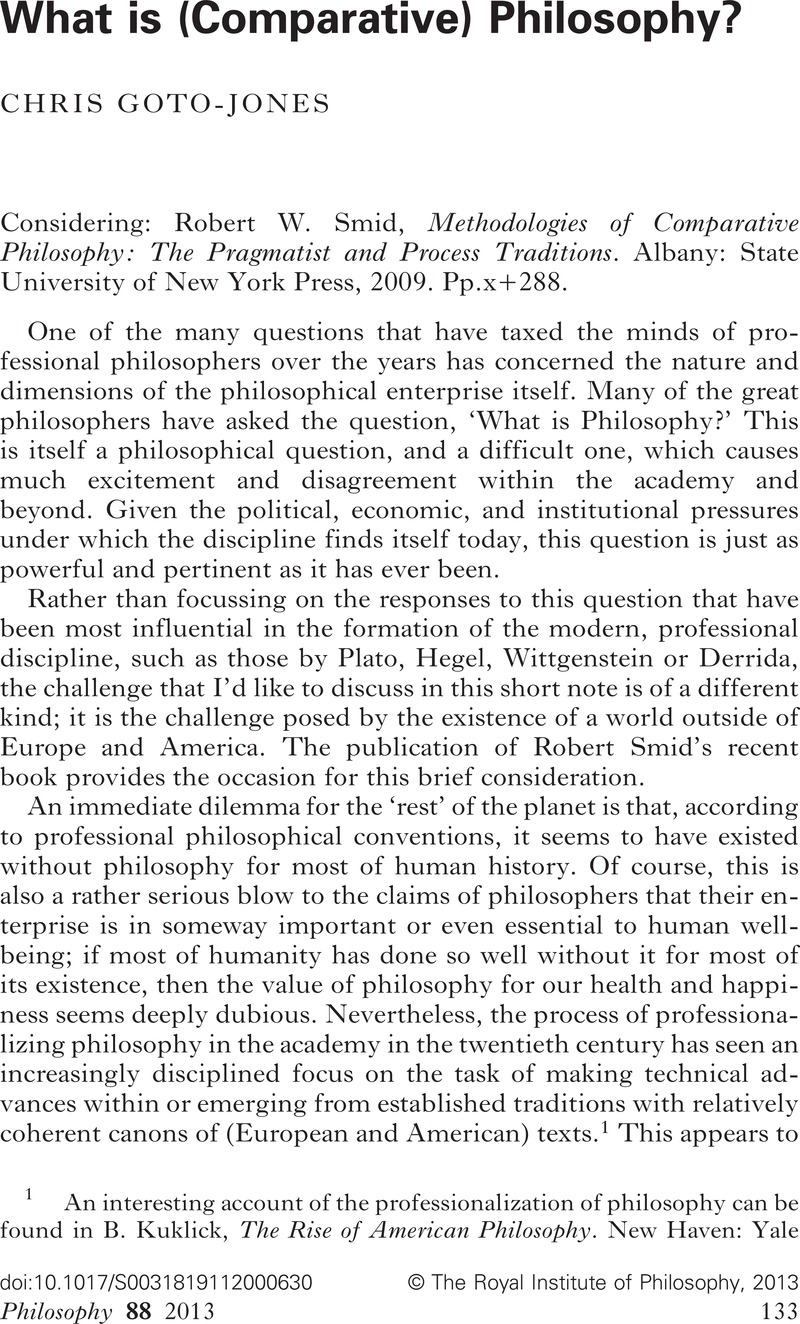Article contents
What is (Comparative) Philosophy?
Published online by Cambridge University Press: 04 January 2013
Abstract

- Type
- Discussion
- Information
- Copyright
- Copyright © The Royal Institute of Philosophy 2013
References
1 An interesting account of the professionalization of philosophy can be found in Kuklick, B., The Rise of American Philosophy. New Haven: Yale University Press, 1977Google Scholar. The fact that this kind of professionalization in the academy is not limited to philosophy but is, in fact, part of the general tendency in the development of the modern university is provocatively phrased in Menand, L., The Marketplace of Ideas: Reform and Resistance in the American University, (New York & London: WW Norton, 2010)Google Scholar.
2 Of course, there are principles of exclusion that could be operable, but we must be clear about their various implications, some of which are offensive.
The least offensive principles in this respect are simply historical ones: the discipline of philosophy has been clearly defined by a set of practices and literacies drawn from a constellation of interleaving intellectual traditions in European history; hence, ideas, thinkers, and traditions from outside that history are not part of the composition of disciplinary philosophy. This makes ‘philosophy’ into a simple, historically descriptive category: Confucius may have been a sophisticated and interesting thinker, but he was not a philosopher. This kind of principle for the category often bleeds over into accounts that make philosophy part of the narrative of ‘Western’ identity; edging ‘philosophy’ very close to ‘culture’. In itself, this is inoffensive. However, it is rarely the case that philosophers (or even historians of philosophy) are content to view their enterprise as wholly located in this kind of category. Indeed, many of the most influential and formative answers to the question ‘What is Philosophy?’ singularly fail to say: it is part of the historical narrative of European identity (although some do). Instead, they tend to emphasise philosophy as the love of wisdom per se, or as a particular engagement with language and reality per se, or as radical epistemological or ontological critique per se. Any appeals to cultural specificity become immediately excluded as cultural theory rather than philosophy. As soon as these kinds of dimensions become essential to the philosophical enterprise, the category of philosophy ceases to be a simple historical one and hence the principles for excluding non-Western sources become less savoury.
In other words, if we seek to exclude non-Western sources on principle, and if we seek to make that principle ethically palatable, then we must reduce the category of philosophy to a simple historical one – as part of cultural studies – and thus surrender the discipline's pretensions to universal knowledge in the interests of its focus on culture and identity formation.
3 This case is made, for instance, in Goto-Jones, Chris, ‘A Cosmos Beyond Space and Area Studies: Towards Comparative Political Thought as Political Thought,’ in Boundary 2, 38:3 (2011)CrossRefGoogle Scholar. A parallel argument about why the oft made ‘comparison’ of Heidegger and Nishida Kitarô should not be considered ‘comparative philosophy’ is in Goto-Jones, Chris, ‘When is Comparative Political Thought (not) Comparative? Dialogues, (dis)continuities, creativity, and radical difference in Heidegger and Nishida,’ in Freeden, Michael & Vincent, Andrew (eds), Comparative Political Thought: Theorizing Practices. (London & New York: Routledge, 2012)Google Scholar.
4 Recent work on Heidegger in this frame includes, Lin, Ma, Heidegger on East-West Dialogue. London: Routledge, 2008Google Scholar. A different perspective is Steven Burik, The End of Comparative Philosophy and the Task of Comparative Thinking: Heidegger, Derrida, and Daoism, (Albany: State University of New York Press, 2010). In terms of approaches from ‘non-Western’ schools of philosophy, much recent work has focussed on the Kyoto School. See, for instance, part 1 of Davis, Bret, Schroeder, Brian, Wirth, Jason (eds), Japanese and Continental Philosophy: Conversations with the Kyoto School, (Bloomington: Indiana University Press, 2011)Google Scholar. Or, in the pages of this journal, Goto-Jones, Chris, ‘If the past is a different country, are different countries in the past? On the Place of the Non-European in the History of Philosophy’ Philosophy 80 (2005)CrossRefGoogle Scholar.
- 1
- Cited by




